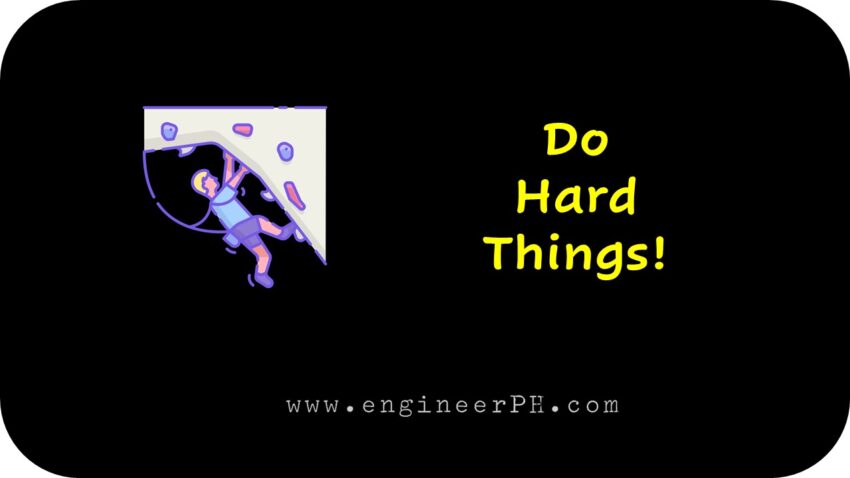Insights from Do Hard Things by Steve Magness. Learn how to develop real toughness.
Ang pagkumpleto ng isang hard and worthwhile endeavor ay nangangailangan ng high level of toughness. Inuugnay ng mga tao ang toughness with complete confidence, brute force, and bravado. Ngunit ang tunay na toughness ay wala sa mga bagay na iyon.
Author Steve Magness has explored the science of toughness, at nakakita siya ng mga nakakagulat na pagkakaiba between the traditional toughness maxims and the science of toughness. For starters:
EMBRACE REALITY
Traditional toughness says, “act confident.” But the science of toughness says, “embrace reality.”
Nang suriin ng US army ang mga resulta from their survival training courses, nalaman nil ana ang mga sundalo na nakaranas ng doubt at inaasahan na ang training ay magiging mahirap, performed much better than the soldiers na nag-aakalang ang training would be a ‘piece of cake.’
As a wise and experienced military friend once told Steve Magness, “An ounce of doubt keeps me sharp.”
Ang iyong perseverance and toughness during the endeavor ay higit na tinutukoy ng iyong mga expectations leading up to that endeavor. Kung minamaliit mo ang challenge, you will panic when the endeavor is more demanding than you thought it would be.
Ang susi to staying tough is assuming nothing will happen as quickly or as smoothly as you hope, ngunit sa sapat na oras at effort, you can achieve more than what most people think is possible. Sa madaling salita, couple short‐term pessimism with long‐term optimism.
ACKNOWLEDGE THE PAIN BUT MAINTAIN EQUANIMITY
Traditional toughness says, “ignore the pain and push on.” The science of toughness says, “acknowledge the pain but maintain equanimity.”
Ang bawat challenging and worthwhile endeavor brings a heavy dose of discomfort. When discomfort strikes, the amygdala ‐ isang maliit na region sa utak that scientists call the body’s alarm system ‐ is activated. Ang mga taong burnout have an overactivated amygdala they cannot calm down.
Upang maiwasan ang burning out and checking out, dapat nating maunawaan ang ating internal alarms and then quickly turn those alarms down and make intelligent decisions. It’s like getting a low fuel alarm habang tayo ay nagmamaneho.
The alarm provides valuable information we should act on, ngunit kung alam nating mayroon tayong sapat na gasoline upang makarating sa next gas station, we don’t need the alarm to continue ringing.
Narito ang isang three‐part method to reliably return your amygdala to baseline and maintain a state of equanimity (evenness and composure in stressful situations):
- Zoom out and explain: Kapag nadidismaya ako while working, I zoom out and see myself from a distance, pagkatapos ay iniisip ko, “Mechaela is getting frustrated.” Explaining stressful situations sa ating sarili in the third person is an effective way to regulate emotion. Sa isang pag-aaral, kids who referred to themselves in the third person while working on a frustrating task were 30% better at regulating their emotions and staying on task.
- Reappraise: Kapag kumuha tayo ng pagsusulit, we can interpret nervousness bilang isang senyales na hindi tayo handa para sa isang test, or we can see it bilang isang senyales na mahalaga ang pagsusulit, and our body is providing us with additional energy to focus. When we reappraise, we identify ways in which discomfort is beneficial. The more we reappraise, the more likely we are to deal with discomfort in a productive manner (rather than running from it or ignoring it).
- Reassure: Ang mga bihasang meditators are so good at calming themselves down after a stressful experience because they have spent thousands of hours observing thoughts and emotions come and go and understand that everything is temporary. Hindi nating kailangang mag-meditate for thousands of hours upang malaman na ang discomfort is a fleeting sensation that rises and falls. If we use discomfort as a cue to tell ourselves, “This too shall pass,” we can return to a state of equanimity.
SATISFY YOUR PSYCHOLOGICAL NEEDS AND YOU’LL WORK HARDER THAN EVER
Traditional toughness says, “forget your psychological needs and just do the work.” The science of toughness says, “satisfy your psychological needs and you’ll work harder than ever.”
Ang mga tao ay may tatlong psychological needs: autonomy, competency, and belonging. If you can cultivate a feeling of autonomy, competency, and belonging during a difficult endeavor, you will dramatically increase your odds of finishing that endeavor.
- Generate a feeling of autonomy sa pamamagitan ng pagkilala na palagi kang may pagpipilian. Even if told what to do, you can choose how you think about it or choose not to do it and accept the consequences.
- Bumuo ng pakiramdam ng competency by constantly feeling like you’re making progress. Reflect on the work you’ve completed in the past few days to get you to where you are today. Pagkatapos, focus sa isang maliit na bagay na maaari mong gawin to continue making progress in the next 5 seconds. For a runner mid‐marathon, that means reflecting on the miles she’s completed and then executing the next few steps as well as she can.
- Generate a feeling of belonging sa pamamagitan ng pag-alala sa mga tao or mission you are struggling for. A soldier sustains mental resiliency during a grueling battle when he fights for the soldiers next to him. A solo entrepreneur deals with setback after setback when she is on a mission to improve the lives of her customers.
“When we satisfy our (psychological) needs, we are allowed to fulfill our potential, (because) our drive comes from within, so fear and pressure no longer consume us.”
– Steve Magness
Author: The Pinoy Engineer
GOOD TO GREAT BOOK SUMMARY FOR FILIPINOS
In this blog, you will find the Best Book Summaries and Productivity Tips in Taglish (Tagalog-English) made specifically and exclusively for Pinoys in and out of the Philippines tulad mo, Kabayan. Self-improvement reading is one of the most productive things to do.
GOLDEN OPPORTUNITY FOR PINOYS
Sabi nga ni Jim Rohn – “Ang pagkakaiba sa pagitan ng kung nasaan ka ngayon at kung nasaan ka limang taon mula ngayon ay makikita sa kalidad ng mga librong babasahin mo”.
If seryoso ka sa iyong personal growth and development, Basahin mo din itong FREE E-book na nagawa exclusive lang para sa mga Pinoy. 7 Steps to Living a Life Full of Abundance. Take Control of your Career, Do what you Love, and be Successful. Download the book na yan ng libre, kaibigan.
Did you find this article helpful na maaaring maapply mo sa professional o personal na buhay mo?
Let us know in the comments below!
If you enjoyed this post, then you might also like:






3 thoughts on “HOW TO DEVELOP REAL TOUGHNESS. WHAT SCIENCE SAYS.”